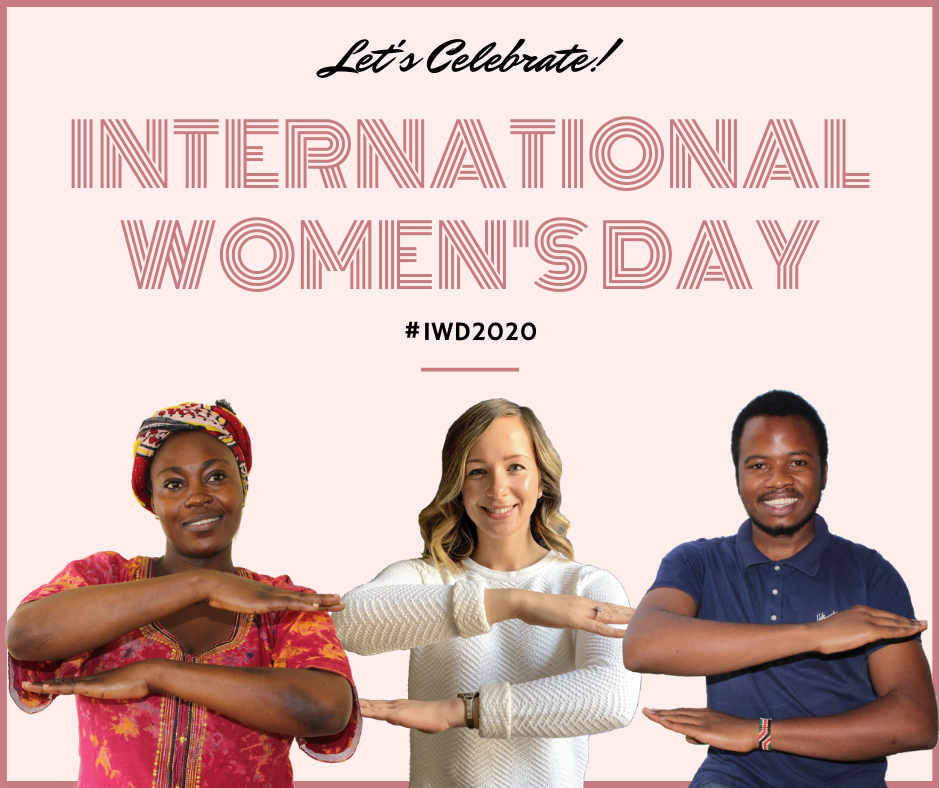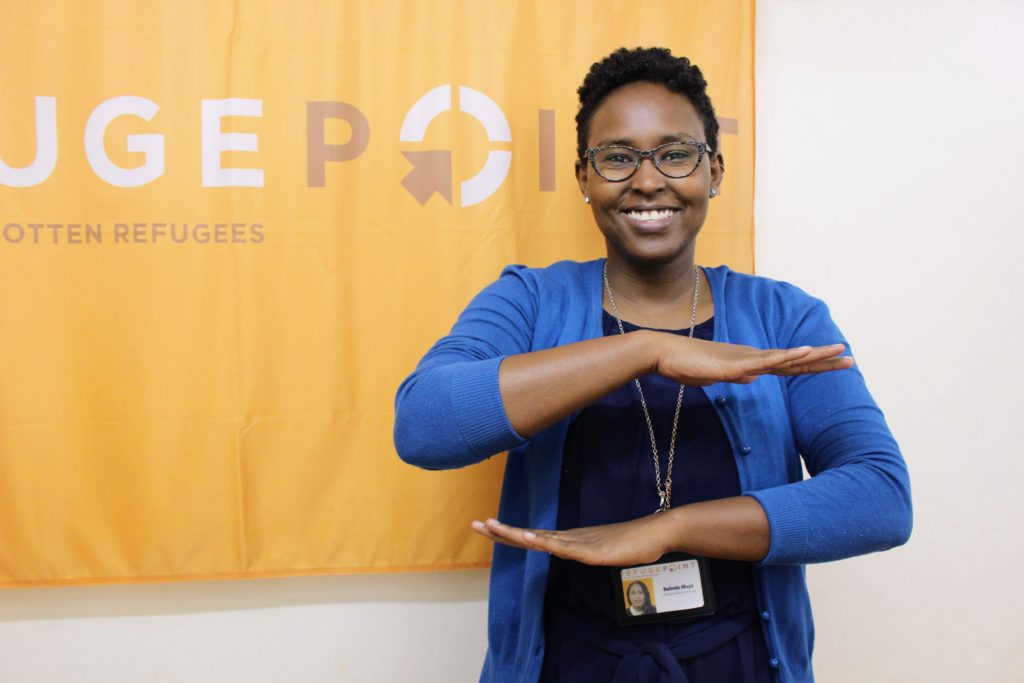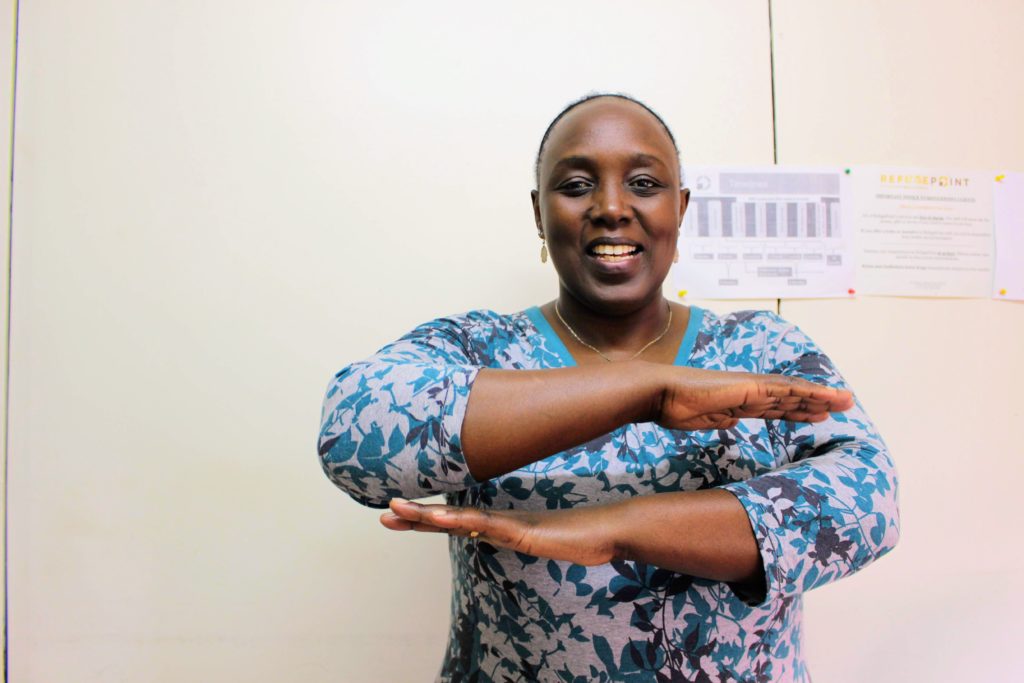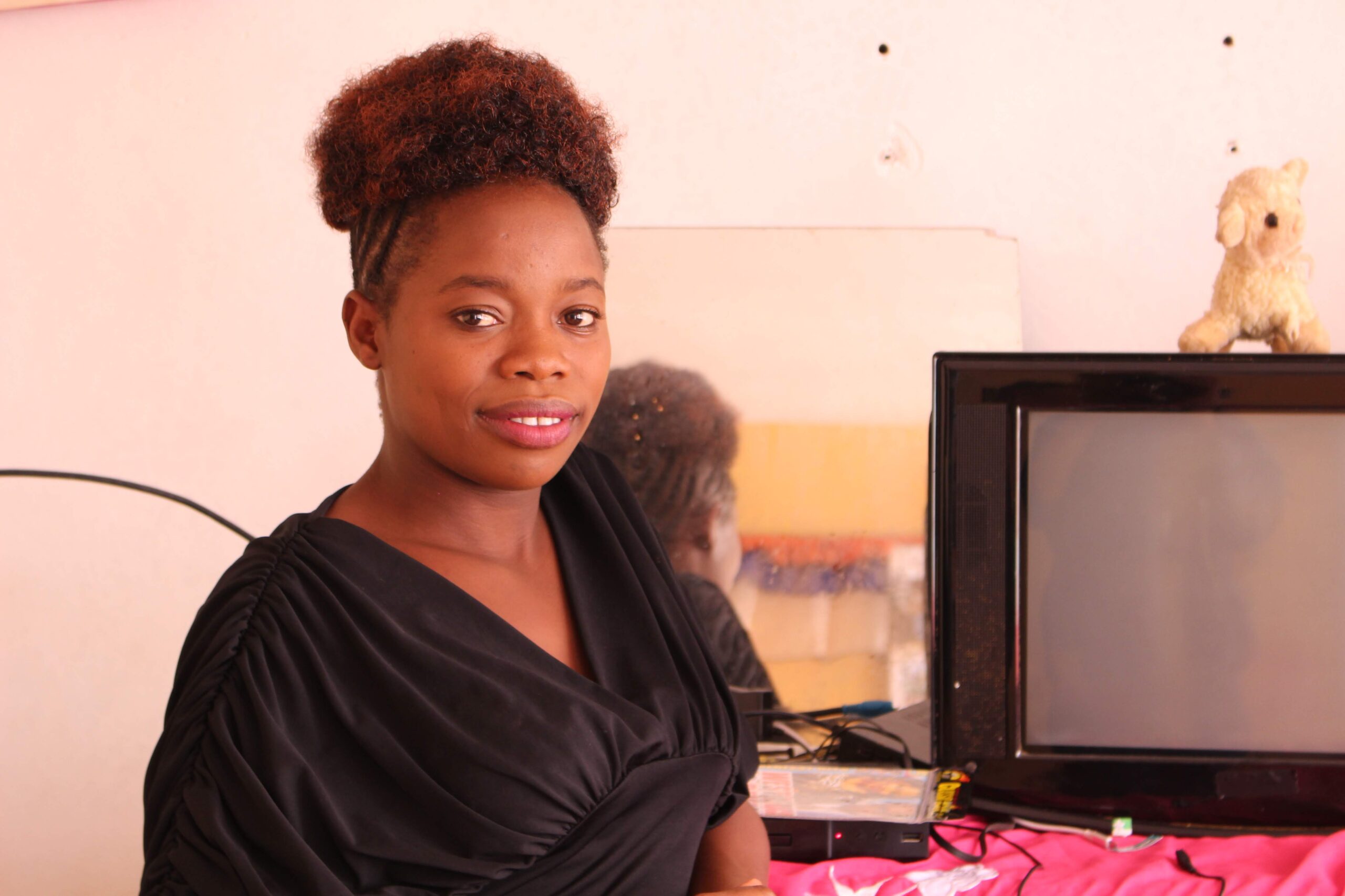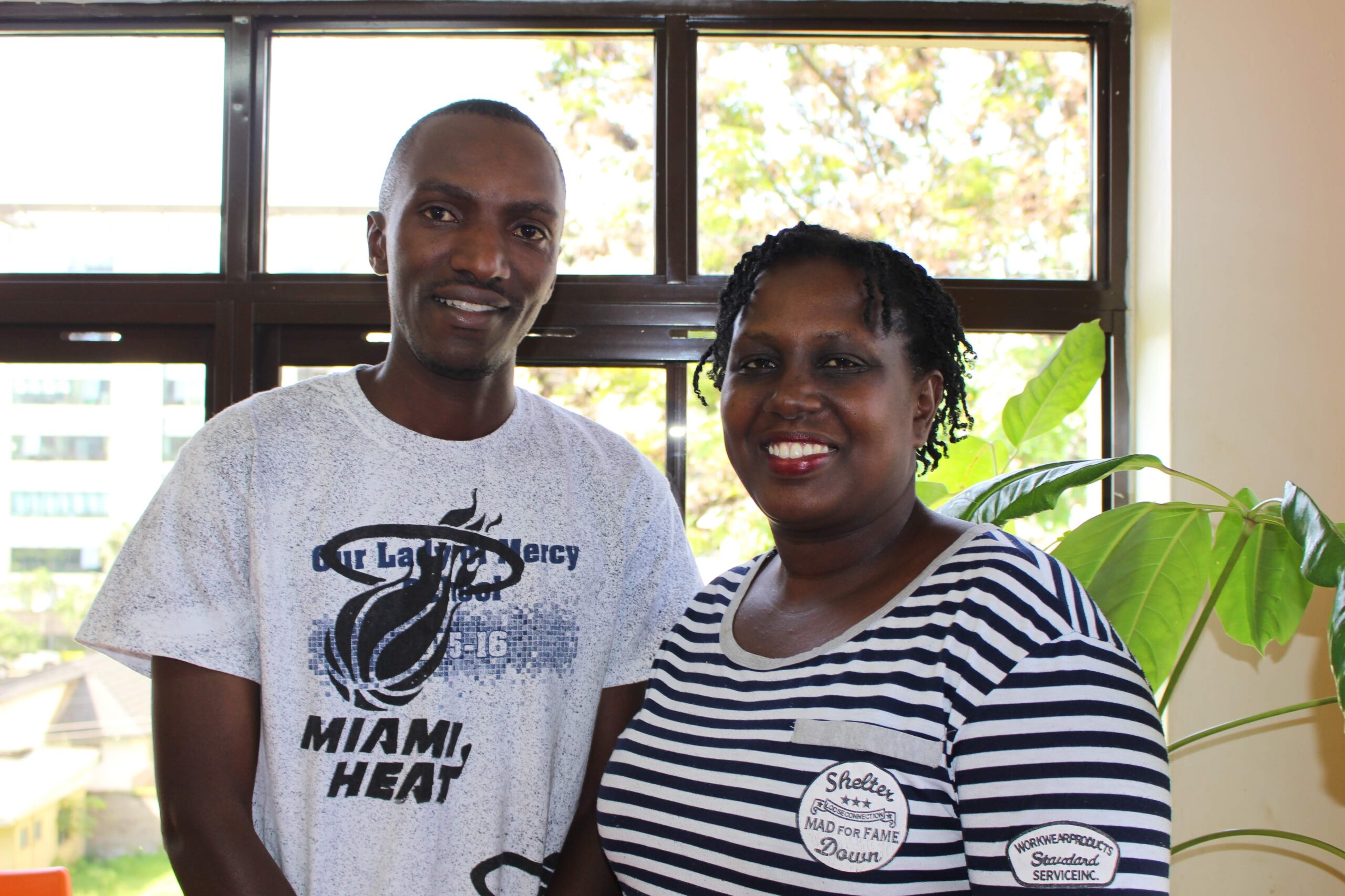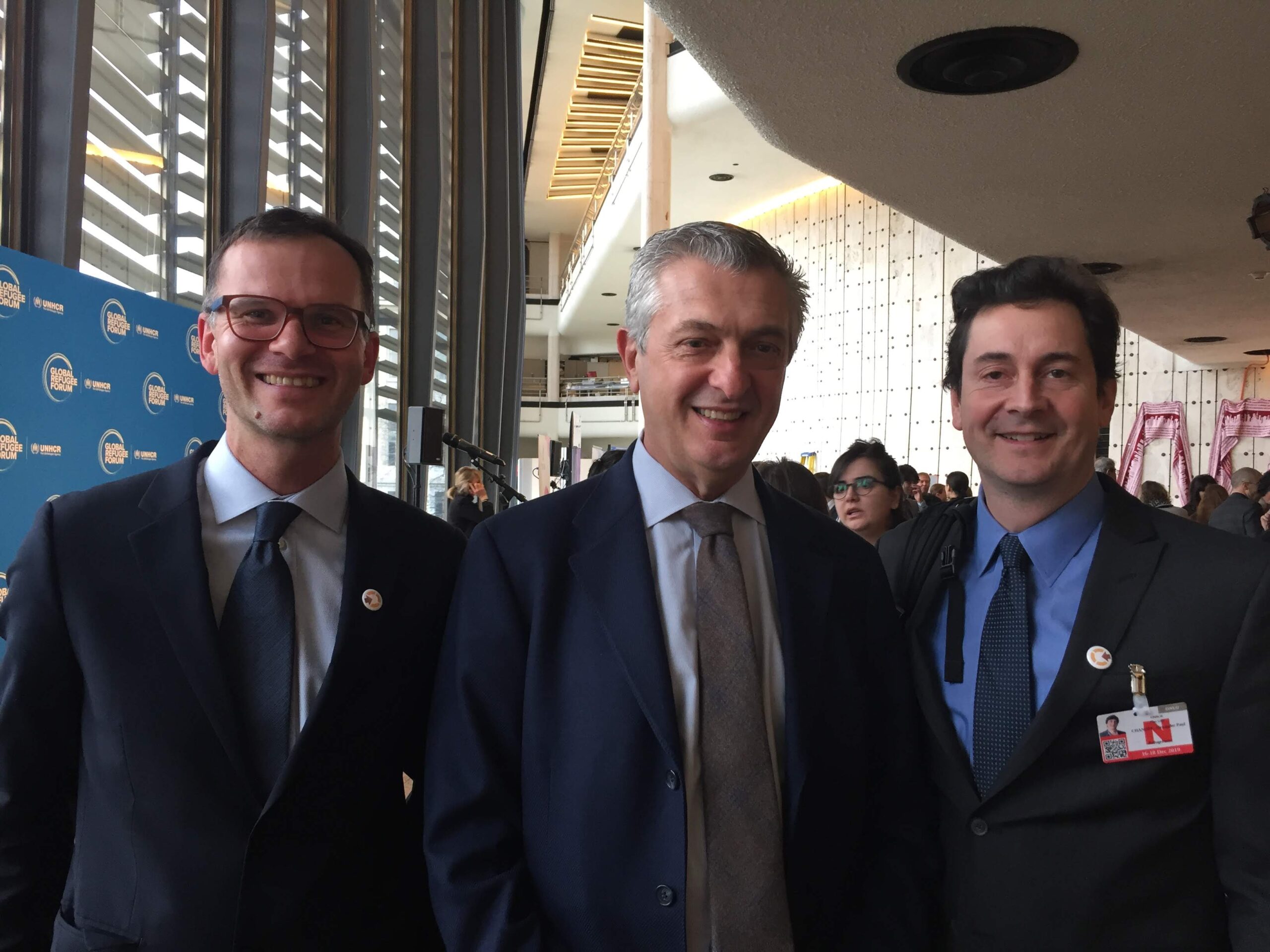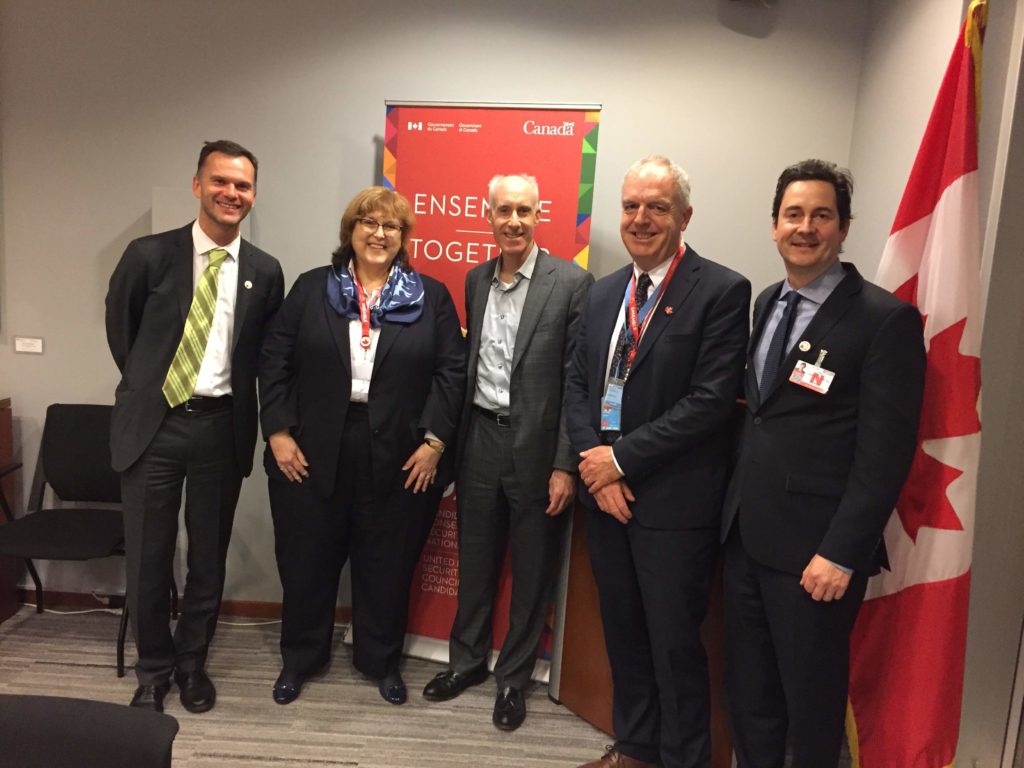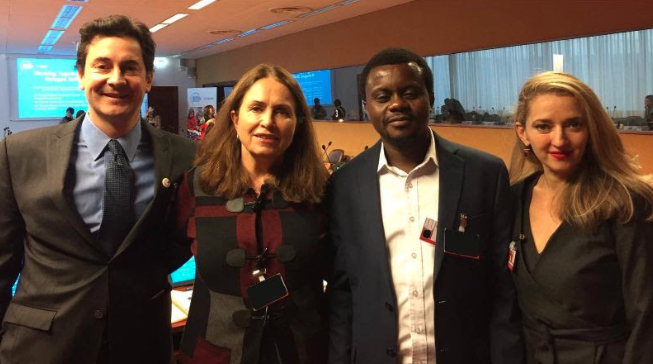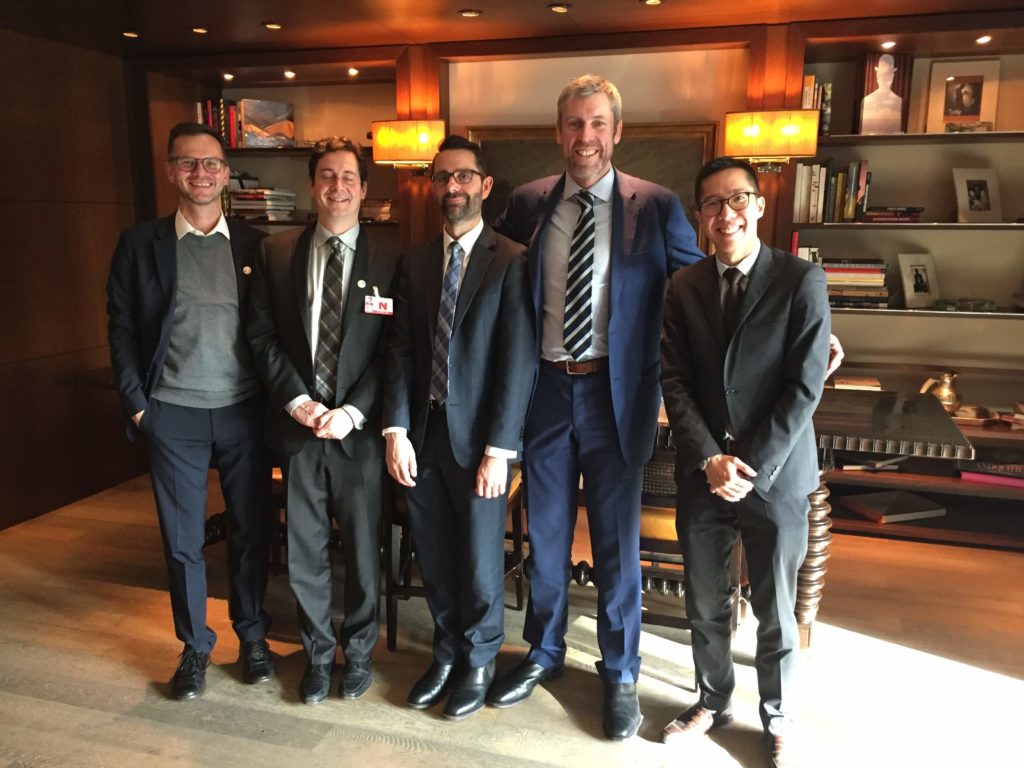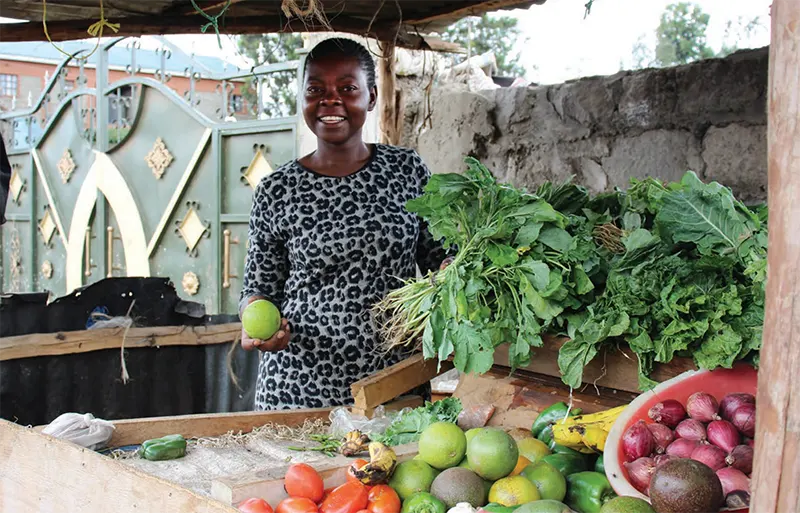Supporting Refugee-Led Organizations
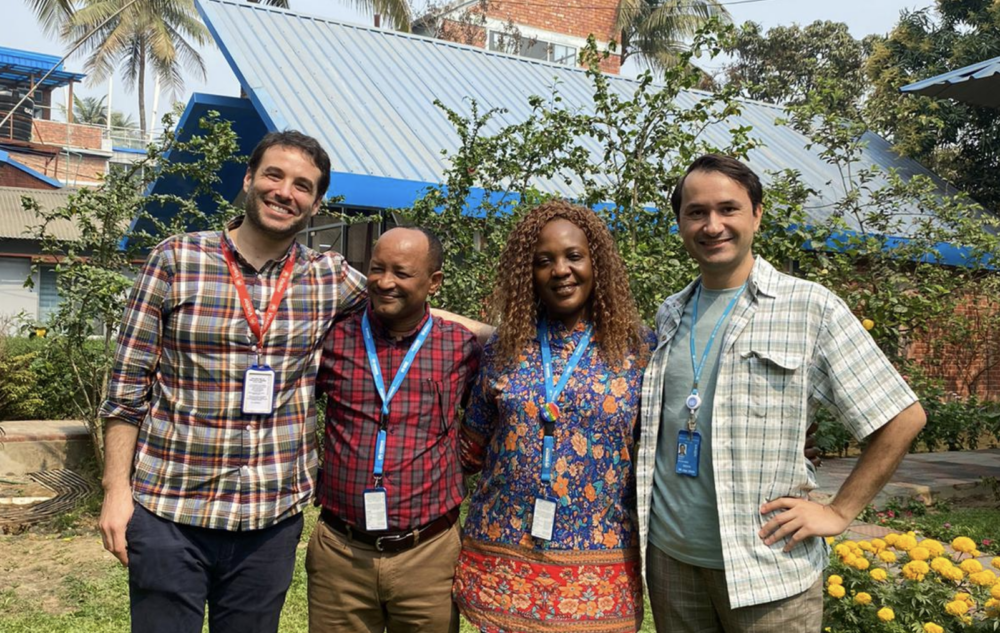
Refugees are their own first responders in their communities. While RefugePoint and other non-governmental organizations join with the United Nations’ commitment to “stay and deliver” our services during the COVID-19 crisis, we recognize that refugees and Refugee-Led Organizations (RLOs) have no choice but to stay and deliver. RLOs need our support now more than ever.
RLOs in Nairobi, Kenya, provide vital life-saving and enriching services to refugees. These include basic needs support (such as food, rent, clothing); targeted support for women and girls; vocational and computer training; language, literacy, and cultural programs; business and career support; and safe housing for LGBTIQ refugees, to name but a few (see “Mission Activities” in the chart below for a more comprehensive list).
RefugePoint recently surveyed RLOs in Nairobi to learn how COVID-19 has impacted their services and the communities they serve, and what their greatest funding needs are. Below we present a list of 16 RLOs in the order that they responded and as they presented themselves – without prioritization, comment, or “vetting.” Our aim is to help these organizations gain greater visibility to attract funding for their work. RLOs commonly operate on shoestring budgets and at great personal sacrifice to their founders and staff. Even a little funding can go a long way.
If you are interested in reaching any of these organizations and need their contact information, feel free to email us at info[@]refugepoint.org. We encourage donors to directly support RLOs whenever possible, as they are a critical and under-recognized force in saving refugees’ lives.
To learn more about how refugees are organizing worldwide to help themselves and their communities, please visit the Global Refugee-Led Network, follow them on Twitter, and read this policy brief.
| # | Name of RLO | Mission Activities | Funding Now Needed For | Target Population | Website |
| 1 | KINTSUGI | English and Swahili classes; community events; food distribution; escorting clients to services; community education; refugee marathon | Distributing soap, food, notebooks, coloring books and pencils for children; community outreach | Refugees in seven neighborhoods and some disadvantaged Kenyans | Website |
| 2 | L’Afrikana community based organization | Language, vocational and computer training; support for single mothers and elders (food and other essentials); fostering youth talents (recording studio and dance troupe) | Distributing food, masks, sanitizers, and other essentials; COVID education | Refugees and some disadvantaged Kenyans | Facebook page |
| 3 | Conflict Transformation for Development | Vocational and entrepreneurship training for women and youth; substance abuse awareness; peacebuilding and conflict resolution; distributing clothes, sanitary pads, scholarly materials, and soap to girls | Distributing food, dignity kits for girls; set up and equip a vocational training centre for youth; conduct research on substance abuse among urban refugee youth, and continue all of our programming. | Refugees in Nairobi and Kakuma Refugee Camp | |
| 4 | Youth Empowerment & Mentorship Initiative (YEMI) | Education of youth for problem-solving, both at personal and community levels; life skills; design thinking; creating a community of problem solvers | Distributing food parcels and other COVID19 response resources such as masks and soap; continue with education programs; develop ingenuity hubs in the community | Refugee youth | Facebook page |
| 5 | South Sudan Reading Society | Peer to Peer Mentorship; Literacy Programs; Leadership Training and Professional Coaching; Educational Programs for Urban Youth; Research Activities; Book Clubs | Continue developing educational materials on teen pregnancy; developing a literacy program for Kakuma’s schools: Hope Primary and Vision Secondary | Teenage girls and young women; School children; Youth (Refugees in Nairobi and Kakuma) | Website |
| 6 | Youth Voices of Nairobi | YVN is a youth-led network of young professional refugees. Activities: Advocacy through media (articles, stories, podcasts); Training to foster self-reliance (English, digital literacy, graphic design, photography, videography); Advocacy for school admission | Distributing food parcels and other COVID19 response resources such as masks and soap | Refugees in Nairobi, with a focus on women and girls. And some disadvantaged Kenyans | Website |
| 7 | Dream Magical Studio | Fee-based photography and video services support our non-profit work. 50% of profits go to community education events, awareness-raising and storytelling workshops | Distributing food parcels and other COVID19 response resources such as masks and soap | Refugees in Kakuma camp | |
| 8 | DAFIKESO | NGO run by Dafi scholarship students in Kenya. Activities: Promoting tertiary education; Advocating for girls’ education in the camps; mentorship programs and career guidance | Distributing facemasks, soap, foodstuffs, and books.
Dafikeso can also provide foodstuffs for centers for special needs refugees run by Jesuit Refugee Services. Awareness-raising about COVID-19. |
Refugees in Nairobi, Nakuru, Eldoret, Kakuma camp and Dadaab camp | Website |
| 9 | KADANA Refugee Network | Advocacy through Universal Periodic Review (UPR) process (human rights monitoring); Fostering peaceful coexistence between host and refugees through sport and other activities; Training refugees on UPR process and laws in collaboration with Kenya National Human Rights Commission | 1. Senitize refugees on the issues of gender based violence and sexual and reproductive health. 2. Continue assistance to 250 vulnerable refugees and 60 host community during this pandemic. 3. Create and increase refugee programs that help in their academic growth. | Refugees and host community in Kenya | Article about KADANA |
| 10 | Creative Youth | Youth empowerment through farming and hydroponic technology; Adult education/literacy; Advocacy for implementation of SDGs; Promoting refugee welfare and helping vulnerable refugees |
Refugees and host community in Kenya | ||
| 11 | iYouth iFuture | Peacebuilding and conflict resolution; Training for youth entrepreneurship; Adult Education; Agriculture and home gardening training; COVID-19 awareness — engaging youth to protect their communities |
Accelerate and expand our fight against COVID-19 while maximizing our efforts to ensure youth engagement in agricultural activities, entrepreneurial activities, and advocacy for peace | South Sudanese and other refugees in Nairobi and Kakuma camp | Organizational information |
| 12 | Borderless Voices Africa | Advocacy for refugee participation in policy-making; Awareness-raising on refugee issues through social media and radio; Colloquium and roundtable discussions between refugees and Kenyans; Highlight the root causes of refugee outflows; Link refugees to resources for viable solutions | Cash transfers for the most vulnerable affected by COVID-19; Providing basic resources i.e facemasks, sanitizers, soap, food | Refugee youth, mothers, children, and elderly | |
| 13 | Philadelphia Refugee Group | Faith-based (Christian) group engaging in: Empowerment of youth with technical skills; Education and awareness through training, e.g. on HIV prevention and drug abuse; Integration of refugee youth and Kenyans through football and dance | Emergency support to vulnerable refugees; continuing existing programs. | Refugees and some Kenyans | |
| 14 | Foundation for Lesbian, Bisexual Queer Refugees (FLBQR) | Safe spaces for LBQ and children; Business and vocational training and livelihoods support for LBQ women; basic needs support for most vulnerable; Advocacy and representation. | Information dissemination on COVID19; rent support to avoid eviction; food and toiletries; COVID19 essential kits like sanitizers, first aid kits, masks, isolation equipments | Currently small scale residential program for 10 women and their children | |
| 15 | Community Empowerment and Self-Support Organization (CESSO) | Safe housing (community house); livelihoods and skills development; language instruction; health and legal services | Rent, food and psychosocial support programs to enable LGBTIQ refugees to get back on their feet. Sanitizers and other COVID basic hygiene items. | LGBTIQ refugees in Nairobi and other cities in Kenya | |
| 16 | Community Support Initiative for Refugees (COSIR) | Emergency shelter and communal safe housing for LGBTQI refugees; Sexual health education, counseling and treatment; Livelihoods and vocational support; Human rights advocacy for LGBTQI refugees | Rent and food support; face masks; hand sanitizers and soap; Buying immune boosters especially for those living with HIV. | LGBTQI refugees |

Refugees are their own first responders in their communities. While RefugePoint and other non-governmental organizations join with the United Nations’ commitment to “stay and deliver” our services during the COVID-19 crisis, we recognize that refugees and Refugee-Led Organizations (RLOs) have no choice but to stay and deliver. RLOs need our support now more than ever.
RLOs in Nairobi, Kenya, provide vital life-saving and enriching services to refugees. These include basic needs support (such as food, rent, clothing); targeted support for women and girls; vocational and computer training; language, literacy, and cultural programs; business and career support; and safe housing for LGBTIQ refugees, to name but a few (see “Mission Activities” in the chart below for a more comprehensive list).
RefugePoint recently surveyed RLOs in Nairobi to learn how COVID-19 has impacted their services and the communities they serve, and what their greatest funding needs are. Below we present a list of 16 RLOs in the order that they responded and as they presented themselves – without prioritization, comment, or “vetting.” Our aim is to help these organizations gain greater visibility to attract funding for their work. RLOs commonly operate on shoestring budgets and at great personal sacrifice to their founders and staff. Even a little funding can go a long way.
If you are interested in reaching any of these organizations and need their contact information, feel free to email us at info[@]refugepoint.org. We encourage donors to directly support RLOs whenever possible, as they are a critical and under-recognized force in saving refugees’ lives.
To learn more about how refugees are organizing worldwide to help themselves and their communities, please visit the Global Refugee-Led Network, follow them on Twitter, and read this policy brief.
| # | Name of RLO | Mission Activities | Funding Now Needed For | Target Population | Website |
| 1 | KINTSUGI | English and Swahili classes; community events; food distribution; escorting clients to services; community education; refugee marathon | Distributing soap, food, notebooks, coloring books and pencils for children; community outreach | Refugees in seven neighborhoods and some disadvantaged Kenyans | Website |
| 2 | L’Afrikana community based organization | Language, vocational and computer training; support for single mothers and elders (food and other essentials); fostering youth talents (recording studio and dance troupe) | Distributing food, masks, sanitizers, and other essentials; COVID education | Refugees and some disadvantaged Kenyans | Facebook page |
| 3 | Conflict Transformation for Development | Vocational and entrepreneurship training for women and youth; substance abuse awareness; peacebuilding and conflict resolution; distributing clothes, sanitary pads, scholarly materials, and soap to girls | Distributing food, dignity kits for girls; set up and equip a vocational training centre for youth; conduct research on substance abuse among urban refugee youth, and continue all of our programming. | Refugees in Nairobi and Kakuma Refugee Camp | |
| 4 | Youth Empowerment & Mentorship Initiative (YEMI) | Education of youth for problem-solving, both at personal and community levels; life skills; design thinking; creating a community of problem solvers | Distributing food parcels and other COVID19 response resources such as masks and soap; continue with education programs; develop ingenuity hubs in the community | Refugee youth | Facebook page |
| 5 | South Sudan Reading Society | Peer to Peer Mentorship; Literacy Programs; Leadership Training and Professional Coaching; Educational Programs for Urban Youth; Research Activities; Book Clubs | Continue developing educational materials on teen pregnancy; developing a literacy program for Kakuma’s schools: Hope Primary and Vision Secondary | Teenage girls and young women; School children; Youth (Refugees in Nairobi and Kakuma) | Website |
| 6 | Youth Voices of Nairobi | YVN is a youth-led network of young professional refugees. Activities: Advocacy through media (articles, stories, podcasts); Training to foster self-reliance (English, digital literacy, graphic design, photography, videography); Advocacy for school admission | Distributing food parcels and other COVID19 response resources such as masks and soap | Refugees in Nairobi, with a focus on women and girls. And some disadvantaged Kenyans | Website |
| 7 | Dream Magical Studio | Fee-based photography and video services support our non-profit work. 50% of profits go to community education events, awareness-raising and storytelling workshops | Distributing food parcels and other COVID19 response resources such as masks and soap | Refugees in Kakuma camp | |
| 8 | DAFIKESO | NGO run by Dafi scholarship students in Kenya. Activities: Promoting tertiary education; Advocating for girls’ education in the camps; mentorship programs and career guidance | Distributing facemasks, soap, foodstuffs, and books.
Dafikeso can also provide foodstuffs for centers for special needs refugees run by Jesuit Refugee Services. Awareness-raising about COVID-19. |
Refugees in Nairobi, Nakuru, Eldoret, Kakuma camp and Dadaab camp | Website |
| 9 | KADANA Refugee Network | Advocacy through Universal Periodic Review (UPR) process (human rights monitoring); Fostering peaceful coexistence between host and refugees through sport and other activities; Training refugees on UPR process and laws in collaboration with Kenya National Human Rights Commission | 1. Senitize refugees on the issues of gender based violence and sexual and reproductive health. 2. Continue assistance to 250 vulnerable refugees and 60 host community during this pandemic. 3. Create and increase refugee programs that help in their academic growth. | Refugees and host community in Kenya | Article about KADANA |
| 10 | Creative Youth | Youth empowerment through farming and hydroponic technology; Adult education/literacy; Advocacy for implementation of SDGs; Promoting refugee welfare and helping vulnerable refugees |
Refugees and host community in Kenya | ||
| 11 | iYouth iFuture | Peacebuilding and conflict resolution; Training for youth entrepreneurship; Adult Education; Agriculture and home gardening training; COVID-19 awareness — engaging youth to protect their communities |
Accelerate and expand our fight against COVID-19 while maximizing our efforts to ensure youth engagement in agricultural activities, entrepreneurial activities, and advocacy for peace | South Sudanese and other refugees in Nairobi and Kakuma camp | Organizational information |
| 12 | Borderless Voices Africa | Advocacy for refugee participation in policy-making; Awareness-raising on refugee issues through social media and radio; Colloquium and roundtable discussions between refugees and Kenyans; Highlight the root causes of refugee outflows; Link refugees to resources for viable solutions | Cash transfers for the most vulnerable affected by COVID-19; Providing basic resources i.e facemasks, sanitizers, soap, food | Refugee youth, mothers, children, and elderly | |
| 13 | Philadelphia Refugee Group | Faith-based (Christian) group engaging in: Empowerment of youth with technical skills; Education and awareness through training, e.g. on HIV prevention and drug abuse; Integration of refugee youth and Kenyans through football and dance | Emergency support to vulnerable refugees; continuing existing programs. | Refugees and some Kenyans | |
| 14 | Foundation for Lesbian, Bisexual Queer Refugees (FLBQR) | Safe spaces for LBQ and children; Business and vocational training and livelihoods support for LBQ women; basic needs support for most vulnerable; Advocacy and representation. | Information dissemination on COVID19; rent support to avoid eviction; food and toiletries; COVID19 essential kits like sanitizers, first aid kits, masks, isolation equipments | Currently small scale residential program for 10 women and their children | |
| 15 | Community Empowerment and Self-Support Organization (CESSO) | Safe housing (community house); livelihoods and skills development; language instruction; health and legal services | Rent, food and psychosocial support programs to enable LGBTIQ refugees to get back on their feet. Sanitizers and other COVID basic hygiene items. | LGBTIQ refugees in Nairobi and other cities in Kenya | |
| 16 | Community Support Initiative for Refugees (COSIR) | Emergency shelter and communal safe housing for LGBTQI refugees; Sexual health education, counseling and treatment; Livelihoods and vocational support; Human rights advocacy for LGBTQI refugees | Rent and food support; face masks; hand sanitizers and soap; Buying immune boosters especially for those living with HIV. | LGBTQI refugees |


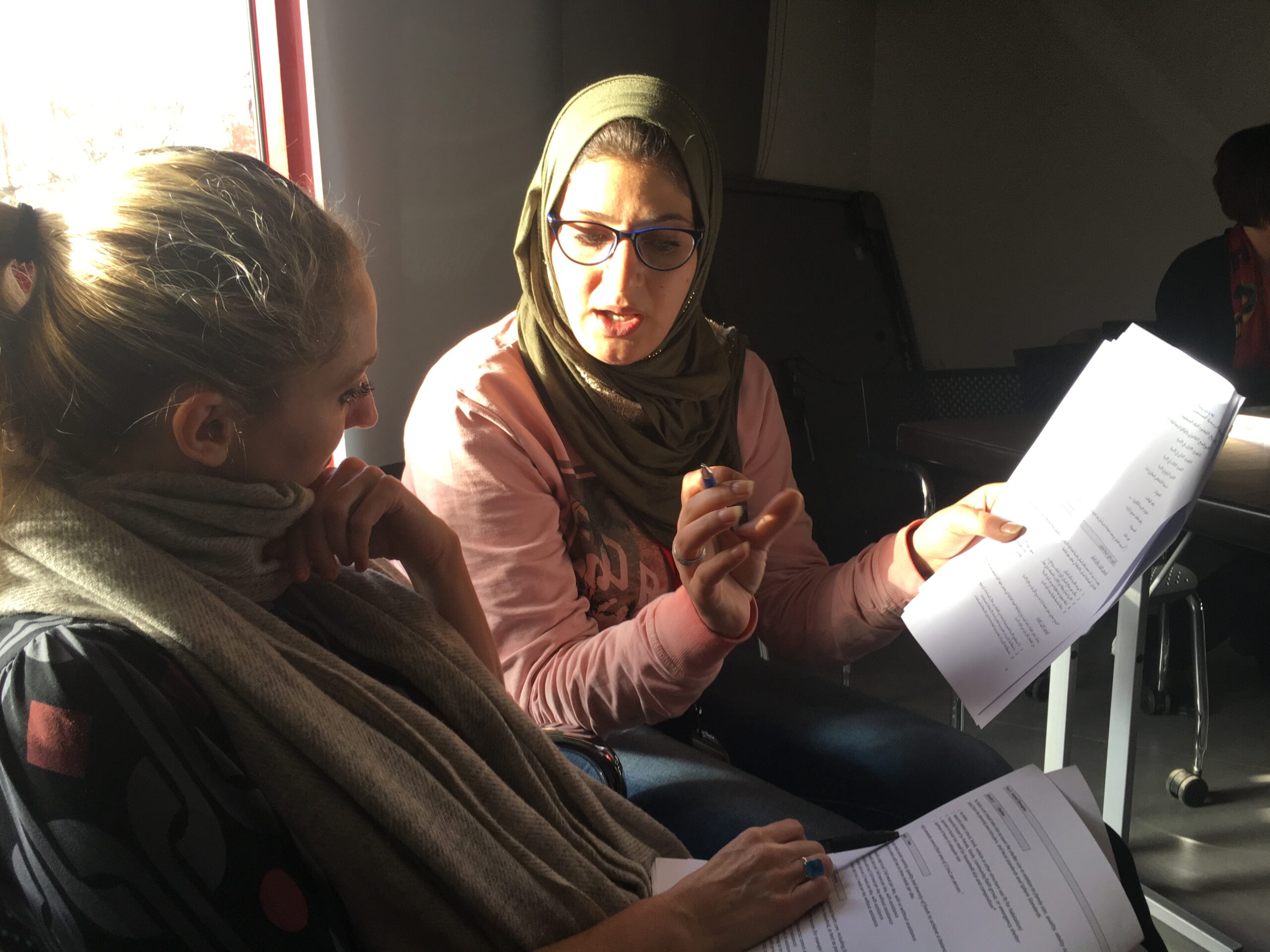 Piloting the Self-Reliance Index in Jordan with Mercy Corps.
Piloting the Self-Reliance Index in Jordan with Mercy Corps. Community Navigators lead a February 25 session in Eastleigh, Nairobi, about pregnancy and nutrition, immunizations, danger signs in pregnancy, and sexual and gender-based violence.
Community Navigators lead a February 25 session in Eastleigh, Nairobi, about pregnancy and nutrition, immunizations, danger signs in pregnancy, and sexual and gender-based violence.